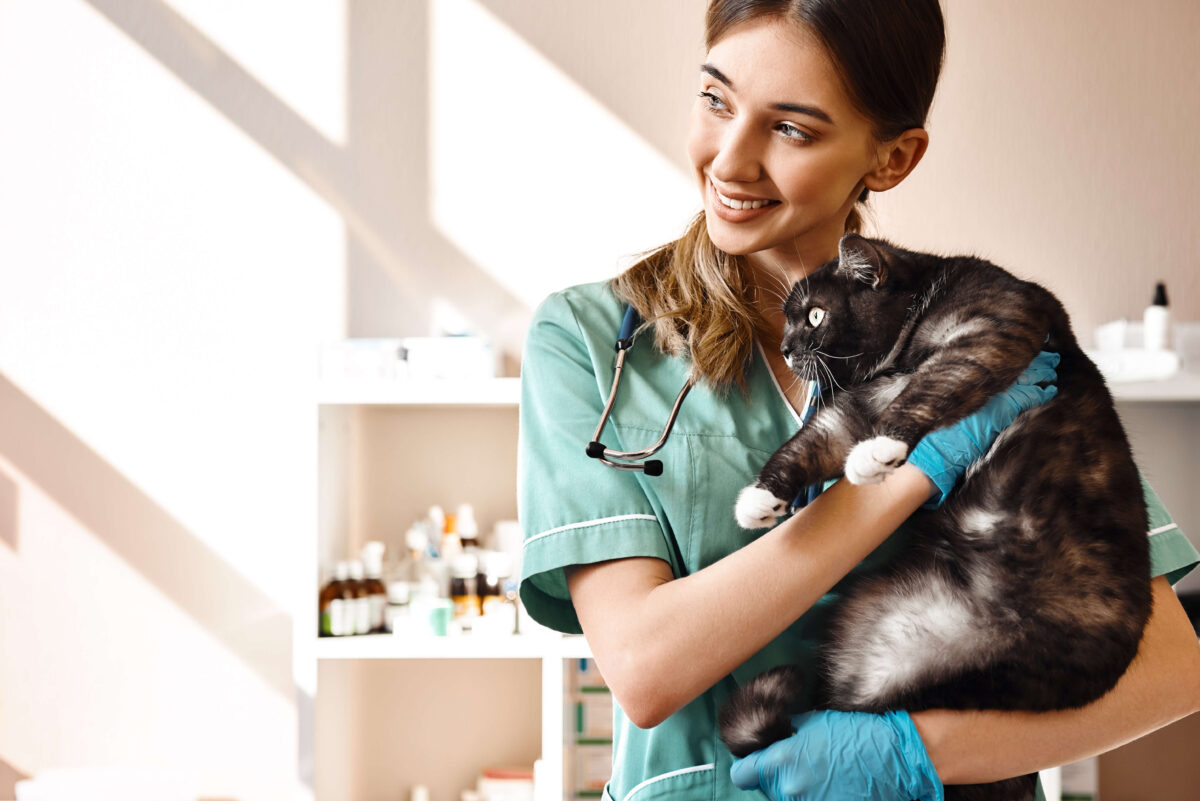Veterinary Assistant: Job Description, Duties, and More

Are you passionate about animals and dream of a career where you can make a meaningful difference in their lives? Look no further – becoming a Veterinary Assistant might be your calling. These unsung heroes play a crucial role in animal healthcare, supporting veterinarians and ensuring the well-being of our beloved pets. In this comprehensive guide, we'll dive into the world of veterinary assistants, exploring their job description, duties, requirements, qualifications, responsibilities, and the promising career it offers.
Interested in other pet careers? Check out our list of 40+ animal jobs.
What Is a Veterinary Assistant?
A Veterinary Assistant is a dedicated professional who works alongside veterinarians and veterinary technicians to provide essential care for animals. They are the backbone of any veterinary clinic, assisting in various tasks to ensure the smooth operation of the facility. Their responsibilities encompass a wide range of duties:
- Basic Animal Care: Veterinary assistants are responsible for feeding, watering, grooming, and exercising animals under their care. This ensures that the pets are comfortable, healthy, and happy while waiting for their appointments.
- Assisting in Medical Procedures: Veterinary assistants help prepare surgical equipment, sterilize instruments, and monitor anesthesia during surgeries. They play a pivotal role in ensuring the safety and success of procedures.
- Client Interaction and Education: These professionals communicate with pet owners, offering advice on basic pet care and providing much-needed emotional support. Their friendly demeanor and empathy are vital in reassuring worried pet parents.
- Administrative Tasks: Keeping the clinic running smoothly is also part of the job. Veterinary assistants handle record-keeping, appointment scheduling, and other administrative tasks, ensuring the clinic operates efficiently.
The role of a veterinary assistant is multifaceted, and their contributions are invaluable. But what qualifications are necessary to embark on this rewarding career?
Requirements and Qualifications
Becoming a veterinary assistant typically requires a combination of education, training, and personal attributes. Here are the key steps:
- Education and Training: While a high school diploma or its equivalent is often the minimum educational requirement, some employers may prefer candidates with post-secondary coursework in animal science or related fields. Enrolling in a veterinary assistant program, like the one offered by The Academy of Pet Careers, can provide a solid foundation for your career.
- Skills and Attributes: To excel in this role, you should possess a deep compassion for animals. This profession demands physical stamina as you'll be on your feet for extended periods and may need to lift heavy animals. Effective communication skills are crucial, as you'll interact with both pet owners and clinic staff.
- Certification and Licensure: While not mandatory in all states, certification can enhance your job prospects. The National Association of Veterinary Technicians in America (NAVTA) offers the Approved Veterinary Assistant (AVA) designation, which can be obtained after completing an accredited program.
Now that you know what it takes to become a veterinary assistant, let's explore the fulfilling responsibilities and career prospects that await you in this field.
Duties and Responsibilities
The day-to-day responsibilities of a veterinary assistant are diverse and vital to the overall well-being of animals under their care. Let's take a closer look at these roles:
Providing Basic Animal Care
- Feeding and Watering: Ensuring animals are fed and hydrated according to their specific dietary requirements is a fundamental responsibility. A veterinary assistant must also observe and report any changes in eating or drinking habits.
- Grooming and Bathing: Keeping animals clean and well-groomed is not only for aesthetic purposes but also for health. Regular grooming helps identify any skin issues or parasites, promoting early intervention.
- Exercising and Walking: Daily exercise and playtime are essential to keep animals active and mentally stimulated. This duty contributes to their physical fitness and happiness.
Assisting in Medical Procedures
- Preparing Surgical Equipment: Before surgery, veterinary assistants are responsible for setting up the operating room, ensuring all instruments are sterilized, and preparing the necessary supplies.
- Sterilizing Instruments: Maintaining the cleanliness and sterility of surgical instruments is vital to prevent infections and complications.
- Monitoring Anesthesia: During surgeries, veterinary assistants assist by monitoring anesthetic levels and the patient's vital signs, ensuring the safety of the animal.
Client Interaction and Education
- Communicating with Pet Owners: Offering a friendly and empathetic presence, veterinary assistants engage with pet owners, explaining procedures, addressing concerns, and providing emotional support.
- Offering Basic Pet Care Advice: In addition to assisting with immediate medical needs, they may offer guidance on topics like nutrition, exercise, and preventive care.
Administrative Tasks
- Record-keeping: Accurate and organized record-keeping is vital for tracking patient histories, medications, and treatments. This information is essential for follow-up care.
- Appointment Scheduling: Managing appointments ensures that clients and their pets receive timely care. Veterinary assistants help maintain an efficient workflow in the clinic.
With these crucial responsibilities, what career opportunities can veterinary assistants look forward to, and what does the job outlook entail?
Career Prospects
A career as a veterinary assistant offers several appealing prospects and opportunities:
Career Advancement Opportunities
As a veterinary assistant, you can take your career further by specializing in areas like:
- Emergency and Critical Care: Working in specialized clinics or hospitals to handle critical cases.
- Exotic Animal Care: Focusing on the care of reptiles, birds, and other non-traditional pets.
- Veterinary Technician: With additional education and certification, you can become a veterinary technician, taking on more advanced responsibilities. Learn more about the differences between a vet assistant and a vet tech.
Job Outlook and Growth in the Field
The demand for veterinary assistants is on the rise due to the growing pet population and increased awareness of animal healthcare. According to the U.S. Bureau of Labor Statistics, employment of veterinary assistants is projected to grow 20% from 2020 to 2030, which is much faster than the average for all occupations.
Salary and Compensation
Salaries for veterinary assistants can vary based on location, experience, and the type of facility they work in. According to the Bureau of Labor Statistics, the median annual wage for veterinary assistants in May 2020 was $28,590.
As you consider embarking on this fulfilling journey, you might have some questions about the role of veterinary assistants. Let's address these in the Frequently Asked Questions section.
Frequently Asked Questions
No, they are not the same. Veterinary assistants primarily provide support to veterinarians and veterinary technicians. They assist with basic animal care, perform administrative tasks, and educate pet owners. In contrast, veterinary technicians have more advanced training and are involved in medical procedures, anesthesia monitoring, and other clinical tasks.
To become a certified veterinary assistant, you can complete a veterinary assistant program, like the one offered by The Academy of Pet Careers, or a similar institution.
Veterinary assistants often work in veterinary clinics, animal hospitals, and emergency care facilities, which may require varied hours. This can include evenings, weekends, and even holidays, as animals need care around the clock. Flexibility in working hours is often part of the job.
Yes, veterinary assistants can work in specialty animal hospitals. These facilities often require additional skills and knowledge, making the role more specialized. For instance, you might work in an emergency hospital, exotic animal clinic, or a facility focused on a particular animal species.
Veterinary assistants can work with both large and small animals, depending on the type of clinic or facility they are employed in. While many veterinary assistants work with small companion animals like dogs and cats, others may work in farm settings or large animal clinics, caring for animals such as horses, cows, and livestock.
Becoming a veterinary assistant is not just a job; it's a calling for those who cherish the well-being of animals. With a range of responsibilities, opportunities for career growth, and a growing demand in the field, this profession offers a rewarding journey. If you're ready to embark on a fulfilling career that involves working closely with animals and making a positive impact, consider becoming a veterinary assistant.
Now that you're well-informed about the role and the path to become a veterinary assistant, you can confidently take the first steps towards this noble profession. Join the ranks of those who dedicate their lives to animal healthcare, and experience the joy of saving lives.
 Author - Joseph Schifano
Author - Joseph Schifano
Joseph Schifano is the owner and President of The Academy of Pet Careers. With over 20 years of experience working in the pet field, managing large scale pet care businesses, he has experience in every facet of the industry. Joseph's focus is primarily on the business of pet care but his passion is in understanding animal behavior how a dog's brain works so we can improve the care we provide as pet professionals. He is a huge advocate for Pet Empowerment and Force Free training methods. Read more in Joseph's full bio.
